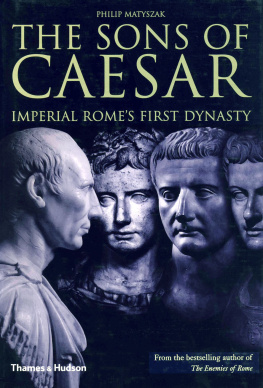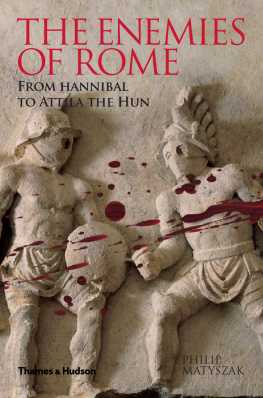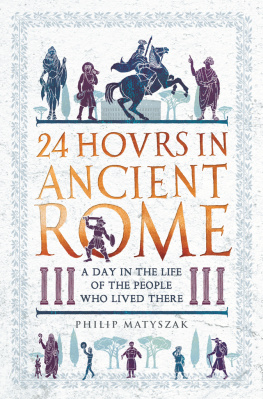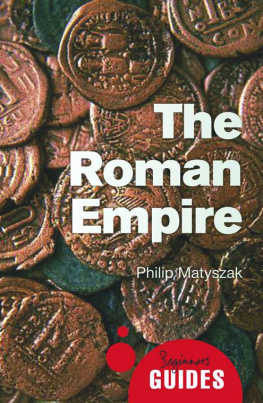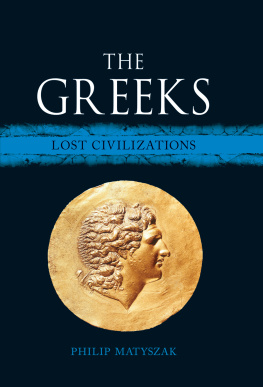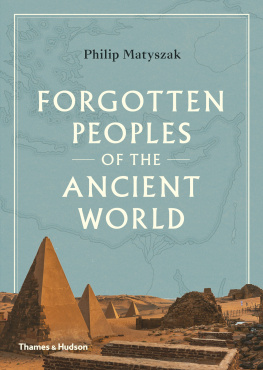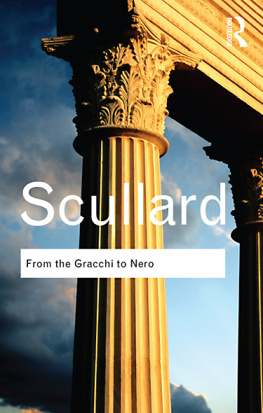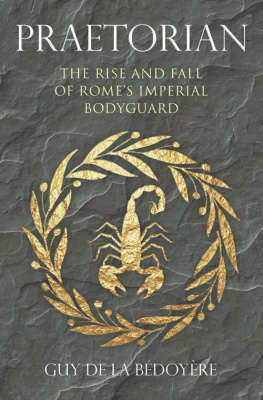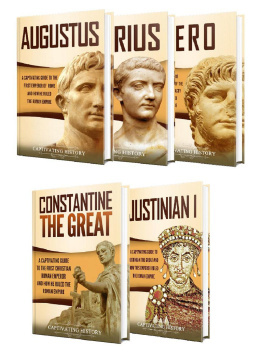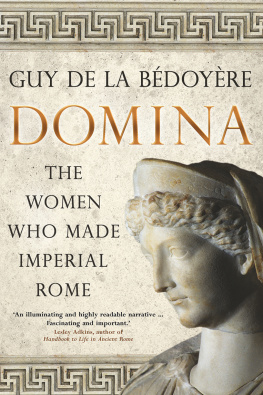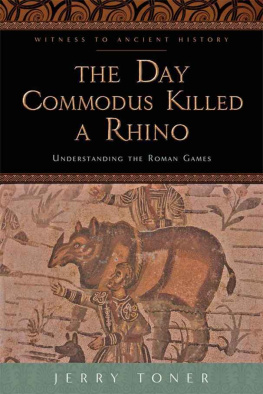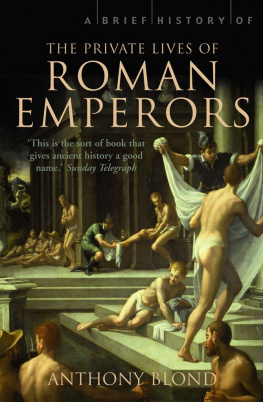

Philip Matyszak has a doctorate in Roman History from St Johns College, Oxford, and is the author of Chronicle of the Roman Republic, The Enemies of Rome and Ancient Rome on Five Denarii a Day. He teaches an e-learning course on Ancient Rome for the Institute of Continuing Education at Cambridge University.
Other titles by Philip Matyszak published by
Thames & Hudson include:
Ancient Rome on Five Denarii a Day
Chronicle of the Roman Republic:
The Rulers of Ancient Rome from Romulus to Augustus
The Enemies of Rome: From Hannibal to Attila the Hun
Gladiator: The Roman Fighters (Unofficial) Manual
The Greek and Roman Myths:
A Guide to the Classical Stories
Lives of the Romans
Legionary: The Roman Soldiers (Unofficial) Manual
Philip Matyszaks Classical Compendium
Other titles of interest published by
Thames & Hudson include:
Chronicle of the Roman Emperors:
The Reign-by-Reign Record of the Rulers of Imperial Rome
Rome in the Ancient World: From Romulus to Justinian
Roman Britain: A New History
The Romans Who Shaped Britain
See our websites
www.thamesandhudson.com
www.thamesandhudsonusa.com
CONTENTS
It is no easy thing to overthrow a democracy, and harder yet to replace it with an autocracy. The social institutions of any society possess a massive inertia which, unlike governments, cannot be changed overnight.
In a democratic republic, the organs of state are separate and may even at times work at cross-purposes, with one acting as a balance for the other. In an autocracy these organs must be deprived of their relative autonomy and reorganized with a clear line of command directly to the autocrat. The culture of these institutions must also be changed so that the primary loyalty of those working within them is to the autocrat rather than to those whom their institution serves. If this fails, then the autocrat may develop parallel institutions which gradually take over the necessary functions of state.
The power elites of the state will be disenfranchised no less effectively than the voters. They must either be co-opted into the new system, eliminated or, at the least, give their grudging blessing. Above all, the people need to be brought to accept the new status quo. Since democracy comes from the Greek and means literally the rule of the people, it follows that it is the people who have the most to lose. In an autocracy, politicians do not need popularity to win office. Sons and husbands cannot choose in which wars they will be called on to fight, nor do they have any say in the level of taxes which are imposed upon them.
Yet this book is a study of the century in which exactly such a transition took place. A century during which Rome underwent the transition from a Republic (a res publica, literally a public thing) into a private family possession. A state based upon law and the ballot mutated into a state based upon the diktat of an emperor and the outcome of palace intrigues. This book studies the process of this mutation, not through detailed socio-political analysis, but through the lives of members of a dynasty which was both the catalyst and chief agent of that change.
It will be argued that the Caesars assumed the role once held by the tribunes, as protectors of the people against an oligarchy which had been running out of control. By a mixture of personal charisma and political skill, the Caesars convinced the Roman people to relinquish their democratic rights in exchange for an implicit promise that autocratic rule would be in their interest. Yet at least some of Romes former oligarchic rulers needed to be co-opted into the imperial project. Caesar failed to do this and paid with his life. Augustus brought the Claudians, perhaps Romes most powerful aristocrats, into such a tight alliance that the dynasty he created is known as the Julio-Claudian.
It is sometimes forgotten how much history was affected by the longevity of Romes first two emperors: the Julian emperor Augustus and his Claudian successor Tiberius. The period from Augustus first consulship in 43 BC until Tiberius death in AD 37 spans a period of eighty years, while the combined reigns of Gaius Caligula, Claudius and Nero amount to less than half of that. Under the rule of Augustus and Tiberius first Italy, and later the Empire, came to enjoy an unprecedented degree of peace and stability. Though the senate justifiably loathed Gaius Caligula, there are no indications that he, or his successor Claudius, seriously threatened that stability. It was only when, under Nero, the effects of misrule were felt by the common people that the Julio-Claudian dynasty was doomed.
Yet by then it was too late. The social momentum was now unstoppable, and the Empire which the Julio-Claudians had brought about was an accomplished fact, even though there were no more Julio-Claudians to head it. The cataclysm of achieving supreme power destroyed these two great and ancient families. Even as the emperors brought peace and prosperity to their Empire, they wreaked havoc among their own kin. For every emperor assassinated by others and it is probable that only Augustus and Tiberius died naturally the Julio-Claudians executed, assassinated and exiled at least half a dozen of their own.
Few families can have compressed such a spectrum of virtues and vices into a few short generations as did that of Caesar and his heirs, yet while the intrigues and follies of Claudius, Caligula and Nero make fascinating history, history they are. It is the first emperors Caesar, Augustus and Tiberius who literally changed the history of the world, and whose shadow remains over us today. The Tsars and Kaisers who used the name of Caesar are gone, yet the pernicious example of Caesar and his heirs continues to convince many that an effective autocracy is superior to a dysfunctional democracy.
Even those just starting out in politics do not rely on their personal qualities to do better than the nobility. They [too] use plots, subterfuge and open violence instead of more honourable routes to military and civil power. As if becoming praetor or consul was wonderful and magnificent in itself, when in reality these offices only deserve respect according to the worth of the people who hold them.
Sallust Jugurthine War 4
At the birth of Julius Caesar in 100 BC, Rome had been a Republic for over 400 years. When the last of Julius Caesars family died in the late AD 70s, Rome was firmly and irrevocably under imperial rule. The history of that transition from republican democracy to military autocracy is also the story of the most remarkable dynasty in antiquity the Julio-Claudians. So colourful were the lives and personalities of Romes first emperors that it is easy to become mesmerized by biographical detail and so miss the massive changes that the Julio-Claudians wrought upon Roman society as a whole.
In effect, the Julio-Claudian dynasty hijacked the government of Rome and turned the state into a personal possession. And they did this so effectively that the civil war which followed the death of the last Julio-Claudian emperor was not about whether to restore the Republic, but about who should now rule their Empire. To achieve this, the Julio-Claudians had to overcome the checks and balances built into the Republic by its founding fathers.
The Republic was born when the Roman people deposed the tyrannical King Tarquin. They were determined never again to be ruled by a monarch (Cato the Censor was later to comment that kings are carnivorous beasts) and they even went so far as to forbid any king of any nation from setting foot in Rome.
Next page
